| Srl | Item |
| 1 |
ID:
149050


|
|
|
|
|
| Summary/Abstract |
In this article I analyze the “rule of law” policy, which the Chinese Communist Party (CCP) adopted as a principle of government at the 15th Party Congress in 1997. I investigate the emergence of rule of law policy and the context in which the CCP introduced it, then examine the concrete measures and actual implementation of the policy. I argue that the rule of law policy is the CCP’s attempt to institutionalize its legal and performance legitimacy. The policy comprises several parts, including intraparty regulations, comprehensive law education for leading cadres, and the readjustment of party-legislative relations. However, the policy has serious problems and consequently has achieved limited results.
|
|
|
|
|
|
|
|
|
|
|
|
|
|
|
|
| 2 |
ID:
082798
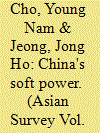

|
|
|
|
|
| Publication |
2008.
|
| Summary/Abstract |
This article analyzes discussions, resources, and prospects for soft power in China, focusing on the Beijing Consensus, foreign policy, and civilization. It posits that the country's recognition of soft power and its application to national policies is an important factor in explaining China's rapidly increasing influence in Asia.
|
|
|
|
|
|
|
|
|
|
|
|
|
|
|
|
| 3 |
ID:
157758
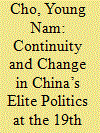

|
|
|
|
|
| Summary/Abstract |
This article analyzes the 19th National Congress of the Chinese Communist
Party (CCP) held in October 2017. It focuses on leadership changes (including
power succession) and revision of the Party Constitution. It tries to answer the
question of whether Xi Jinping’s “one-man rule”, instead of collective leadership,
was established after the Congress. First, it looks at several norms concerning
personnel selection (including the 68 age-limit regulation) that play a critical role
in maintaining collective leadership. Second, it examines to which extent the 19th
Party Congress upheld these norms. Third, this paper investigates the enshrining of
Xi Jinping Thought in the Party Constitution and the implications with regards to
the changes of elite politics. It argues that the Party Congress followed the norms
relatively well, and that collective leadership still persists. In other words, Xi’s
“one-man rule” is not established yet
|
|
|
|
|
|
|
|
|
|
|
|
|
|
|
|
| 4 |
ID:
100975
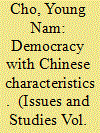

|
|
|
| 5 |
ID:
083358


|
|
|
|
|
| Publication |
2008.
|
| Summary/Abstract |
This article analyzes China's changing elite politics in the Hu Jintao era with a focus on the 17th National Congress of the Chinese Communist Party (CCP) held in October 2007. The Congress addressed the two issues of personnel reshuffles (including leadership transition) and policy changes. Both issues are considered to be the most vital and sensitive elements of China's elite politics. Therefore, the 17th Party Congress is an important window through which China's changing elite politics in the Hu era can be assessed. This article examines, first, two critical trends of elite politics in the Jiang and Hu eras. Then, it analyzes the main features of personnel changes at the Congress. Third, it delves into the revision of the Party Constitution as a case study of changing Party policy. Finally, this article discusses the relevance and limits of factionalism in analyzing Chinese politics. Based on these analyses, it posits that the personnel reshuffles and the changes of Party policy at the 17th Party Congress confirm the two main trends of China's elite politics: the formation of collective leadership based on power-sharing between major informal groups (factions) and the enlargement of intra-party democracy or elite democracy.
|
|
|
|
|
|
|
|
|
|
|
|
|
|
|
|
| 6 |
ID:
057956
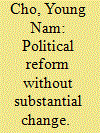

|
|
|
| 7 |
ID:
074814
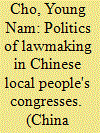

|
|
|
|
|
| Publication |
2006.
|
| Summary/Abstract |
This article analyses the politics of lawmaking in Chinese provincial people's congresses. When the introduction of a market economy and governance according to law policy compelled the Party to open the political arena of lawmaking, the political process in China became more consultative and sophisticated, and political actors more diversified and competitive. In local legislative politics, government agencies, legislature committees and various social organizations began to take part in open-ended contestation of persuasion, and they frequently clashed and co-operated with each other to augment their organizational interests. Provincial people's congresses, after having secured their lawmaking authority since the late 1990s, have played two distinct roles: as co-ordinators of conflicts of interests and as representatives of various social groups' voices.
|
|
|
|
|
|
|
|
|
|
|
|
|
|
|
|